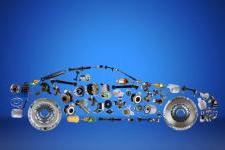Latest News On Hydrogen Fuel Cell Cars - Are They the Future?

Bosch, an automotive parts supplier company, have teamed up with Powercell Sweden AB to produce fuel cell technology for cars and trucks. We take a look at the latest news on hydrogen fuel cell cars and their benefits.
What is the Latest news on hydrogen fuel cell cars?
Under their agreement, the German auto supplier said that both companies will collaborate together to make polymer-electrolyte membrane (PEM) fuel cells for mass production by 2022.
“By teaming up with Bosch we can achieve a commercial break-through within the automotive industry that would be very hard for us to accomplish on our own,” says Per Wassén, CEO of PowerCell.

After the European Union passed legislation for trucks to cut carbon dioxide (CO2) emissions by 2025, and 30 percent by 2030, Bosch estimates that 20% of all electric vehicles globally will be powered by fuel cells by 2030.
Both companies admitted that this target can only be reached by electrifying more and more of the powertrain, with the fuel cell playing a crucial role.
“Once they have become established in trucks, Bosch fuel-cell powertrains will then increasingly find their way into passenger cars. But for this to happen, the cost of fuel cell systems needs to be progressively reduced,” Bosch explained.
Bosch says that the most expensive material is the fuel cell stack, so achieving economies of scale through manufacturing development is vital for pushing down costs for all hydrogen fuel cell trucks and cars. Once this is accomplished, the next step will be to figure out how to make hydrogen affordable for drivers (current price for filling up is above £4.30 per kilo).
What are hydrogen fuel cell cars?
In simple terms, a hydrogen car is a car that uses hydrogen to power an electric motor. In fact hydrogen cars can be better described as hybrids, because they use two power sources - in  this case a regular battery and the hydrogen fuel cell - both of which power the electric motors.
this case a regular battery and the hydrogen fuel cell - both of which power the electric motors.
Also, the battery reserves any energy produced during braking. This energy can be utilized if the motor needs further energy, for example, when you put your foot down.
Like any conventional petrol or diesel car, you can inject hydrogen into its fuel tanks at hydrogen fueling stations. When you put hydrogen in, the resulting chemical process creates a flow of electricity and the only byproducts are heat and water.
Hydrogen cars have a long driving range. The Hyundai Nexo, for example, claims a driving range of 800 kilometers - which is more than the long-range version of the Tesla model 3. This combination of longer driving ranges and fast refueling makes hydrogen cell cars more suitable for drivers travelling long distances, or for people who are unable to charge their plug-in cars at home.
View our Hyundai Nexo leasing prices
Benefits of hydrogen fuel cell cars?
Hydrogen fuel cell cars have various benefits compared to conventional petrol and diesel cars. Benefits include;
#1 Efficient - Fuel cells have a higher efficiency than diesel or petrol engines
#2 Fewer emissions and longer driving range - Unlike conventional petrol and diesel cars, which discharge harmful emission into the air, including carbon dioxide, hydrogen fuel cell cars only emit heat and water, meaning they create no pollution when they’re driven - which as a result helps the ongoing battle against climate change. As mentioned above, hydrogen cars also have a longer driving range.
#3 Silent - It is no secret that conventional cars are loud. This is essentially because there are many moving parts in the engine which contributes to conventional cars being loud. Hydrogen fuel cell cars are quiet, and have very few moving parts.
#4 Fossil fuels - One day fossil fuels like oil will eventually become non-existant, therefore we need to find more cheaper, renewable energy resources. Hydrogen fuel cell cars are an unlimited resource (though technology is still being developed), meaning they provide greater energy security and bring down costs. There are many sources of hydrogen energy such as biomass, water, sunlight and wind.
#5 Lightweight - Compared to electric cars, hydrogen fuel cell cars are significantly lighter. This is because the batteries are heavy. Hydrogen cars have a thin membrane layer which allows the chemical reaction between hydrogen and water for electricity. This ultimately means that fuel cells can weigh significantly less than batteries. As a result, hydrogen cars will have better efficiency and performance compared to electric cars.
Other benefits include that hydrogen fuel cell cars are exempt from the London congestion charge and they incur company car tax at a very low rate. Another potential environmentally-friendly benefit, is that hydrogen can be produced on-site at a filling station, while conventional cars with petrol or diesel need to be transported from a refinery.
Where can i fill up my hydrogen car?
 There’s only a limited amount of hydrogen filling stations available in the UK - 13 to be exact. They are not too dissimilar from petrol stations. All you have to is attach the charger to the car and wait for it to gradually fill the tank. It takes approximately 3-5 mins to fully charge. Compared to how long some EV chargers can take, this charging time frame is extremely convenient for drivers.
There’s only a limited amount of hydrogen filling stations available in the UK - 13 to be exact. They are not too dissimilar from petrol stations. All you have to is attach the charger to the car and wait for it to gradually fill the tank. It takes approximately 3-5 mins to fully charge. Compared to how long some EV chargers can take, this charging time frame is extremely convenient for drivers.
6 hydrogen filling stations are based within London M25 orbital motorway, while four are in north of London. The government have set plans in motion to build even more hydrogen filling stations in the future - 65 filling stations by 2020 and 1,150 by 2030. To view all the hydrogen fuelling stations worldwide (UK included), click here.
Read more: Find an electric car to suit your budget
Are hydrogen cars safe?
Perhaps the biggest question for potential UK buyers, is how safe are hydrogen cars? For example, the Toyota Mirai, is deemed by experts as safe as any of Toyota’s other cars. The carbon-fibre tanks that hold the fuel are very strong. The Mirai has multiple leak detectors and various safeguards to make sure that filling up the car with hydrogen is as safe as it can possible be. Euro NCAP awarded the Hyundai Nexo a rating of five stars for crash safety.
What are the best hydrogen fuel cell cars currently available?
There are currently only three hydrogen fuel cell cars available for UK buyers: Hyundai Nexo and the Toyota Mirai.
Toyota Mirai

MPG (COMBINED): 0
0 to 62 MPH (SECS): 9.60
Number of seats: 4
Top speed: 111mph
Standard features; Adaptive cruise control, Electric power steering, 7” touch screen, Reversing camera, DAB Digital radio, LED daytime running lights, illuminated entry system, traction control
Hyundai Nexo

MPG (COMBINED): 0
0 to 62 MPH (SECS): 9.50
Number of seats: 5
Top speed: 111mph
Standard features; 12.3” touch screen displays, Android Auto, Apple CarPlay, GPS Navigation, dual front USB charging points, Eight-way power seat adjustment, Lumbar support
These vehicles are all eligible for the UK plug in grant scheme. To apply for the UK plug-in grant scheme, visit gov.uk.
View our Company Car leasing prices






